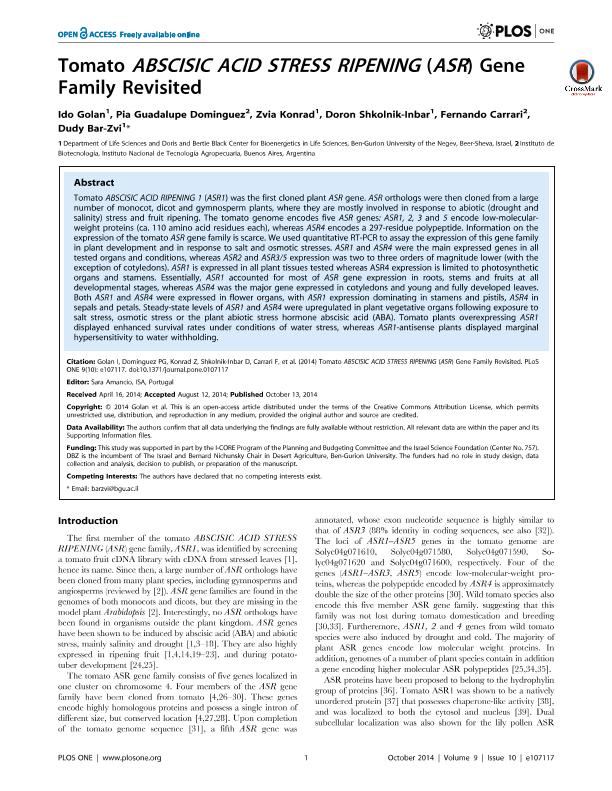Artículo
Tomato ABSCISIC ACID STRESS RIPENING (ASR) Gene Family Revisited
Golan, Ido; Dominguez, Pia Guadalupe ; Konrad, Zvia; Inbar, Moshe; Carrari, Fernando Oscar
; Konrad, Zvia; Inbar, Moshe; Carrari, Fernando Oscar ; Bar-Zvi, Dudy
; Bar-Zvi, Dudy
 ; Konrad, Zvia; Inbar, Moshe; Carrari, Fernando Oscar
; Konrad, Zvia; Inbar, Moshe; Carrari, Fernando Oscar ; Bar-Zvi, Dudy
; Bar-Zvi, Dudy
Fecha de publicación:
10/2014
Editorial:
Public Library of Science
Revista:
Plos One
ISSN:
1932-6203
Idioma:
Inglés
Tipo de recurso:
Artículo publicado
Clasificación temática:
Resumen
Tomato ABSCISIC ACID RIPENING 1 (ASR1) was the first cloned plant ASR gene. ASR orthologs were then cloned from a large number of monocot, dicot and gymnosperm plants, where they are mostly involved in response to abiotic (drought and salinity) stress and fruit ripening. The tomato genome encodes five ASR genes: ASR1, 2, 3 and 5 encode low-molecular-weight proteins (ca. 110 amino acid residues each), whereas ASR4 encodes a 297-residue polypeptide. Information on the expression of the tomato ASR gene family is scarce. We used quantitative RT-PCR to assay the expression of this gene family in plant development and in response to salt and osmotic stresses. ASR1 and ASR4 were the main expressed genes in all tested organs and conditions, whereas ASR2 and ASR3/5 expression was two to three orders of magnitude lower (with the exception of cotyledons). ASR1 is expressed in all plant tissues tested whereas ASR4 expression is limited to photosynthetic organs and stamens. Essentially, ASR1 accounted for most of ASR gene expression in roots, stems and fruits at all developmental stages, whereas ASR4 was the major gene expressed in cotyledons and young and fully developed leaves. Both ASR1 and ASR4 were expressed in flower organs, with ASR1 expression dominating in stamens and pistils, ASR4 in sepals and petals. Steady-state levels of ASR1 and ASR4 were upregulated in plant vegetative organs following exposure to salt stress, osmotic stress or the plant abiotic stress hormone abscisic acid (ABA). Tomato plants overexpressing ASR1 displayed enhanced survival rates under conditions of water stress, whereas ASR1-antisense plants displayed marginal hypersensitivity to water withholding.
Palabras clave:
Tomato
,
Asr
,
Ripening
,
Water Stress
Archivos asociados
Licencia
Identificadores
Colecciones
Articulos(SEDE CENTRAL)
Articulos de SEDE CENTRAL
Articulos de SEDE CENTRAL
Citación
Golan, Ido; Dominguez, Pia Guadalupe; Konrad, Zvia; Inbar, Moshe; Carrari, Fernando Oscar; et al.; Tomato ABSCISIC ACID STRESS RIPENING (ASR) Gene Family Revisited; Public Library of Science; Plos One; 9; 10; 10-2014; 1-8; e107117
Compartir
Altmétricas



